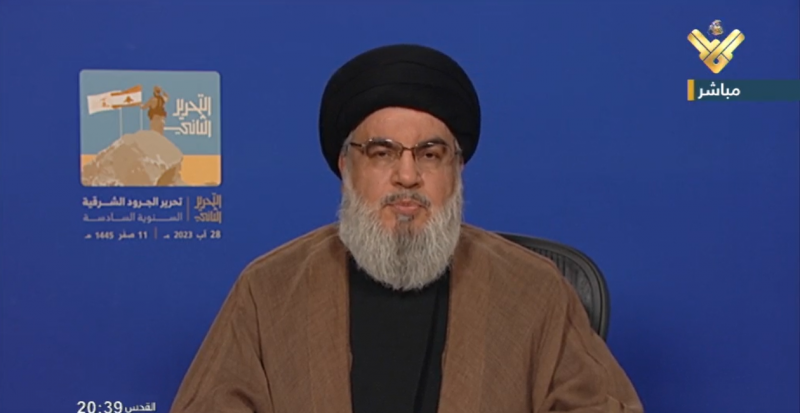
Hassan Nasrallah during a televised speech, on Aug. 28, 2023. (Screengrab / Al-Manar TV channel)
Hezbollah Secretary General Hassan Nasrallah delivered a televised speech Monday evening to mark the sixth anniversary of what the Shiite party calls the ''second liberation'' — the battle against jihadists who were deployed in the jurds (hinterland) of Arsal, in the Bekaa, on the border with Syria.
In July 2017, Hezbollah launched the battle of the Arsal jurd against the jihadists of the Fatah al-Sham Front (formerly al-Nosra Front, the Syrian branch of al-Qaeda).
At the end of the fighting, Hezbollah had succeeded in dislodging the jihadists from the areas they controlled and had reached an agreement for them to be evacuated from Lebanon to Syria.
Nasrallah's speech comes as UNIFIL's mandate is due for renewal on Thursday, after a year marked by tensions between the UN force and residents of the south, a region where Hezbollah is predominant.
There is also a tug-of-war over the removal of a point from the renewal resolution approved last year that Hezbollah strongly dislikes: Article 16, which grants permission to the UN force to carry out its mission ''without prior authorization'' and ''independently'' of the Lebanese Army. This amendment aroused the ire of the Lebanese authorities and Hezbollah, who were unable to remove it.
Here are the key statements of Nasrallah's speech
About UNIFIL mandate renewal
- "The Lebanese government is working on 'fixing last year's mistake' of giving UNIFIL the right to move across Lebanon freely."
- "The Security Council, because of the Americans, doesn't see what Israel is doing in Lebanon, its threats and infringements of sovereignty. They only want Lebanon not to be a threat to the [Israeli] enemy. They want UNIFIL to work for Israel, to be a spy in Israel's pay."
- "A foreign armed force moving around Lebanon without agreement with the army is an attack on our sovereignty. Hezbollah, on the other hand, is not a foreign force. This [Hezbollah's weapons] is another issue, between true sovereigntists and those who follow American orders."
- "The people of the South will not allow a decision to be implemented in spite of the Lebanese government."
About the presidential vacancy
- ''Some say they will not allow Hezbollah's candidate to be elected [to the presidency]. Some say they want to build a state to confront Hezbollah. However, the first to ask for Hezbollah to be disarmed is Israel, so you are serving the interests of [Israel].''
- ''Some parties rejected a recent French proposal. Would have they dared to do that if it had been proposed by an American emissary?"
- "We are ready for dialogue on the presidential issue, unlike other parties, but we will not beg for it. Should we force dialogue with these parties?"
- "The only open dialogue in the country that can be relied on is our dialogue with Free Patriotic Movement."
- "We've been proposed the matter of financial and administrative decentralization and, if we agree on a draft, we will discuss it with other parties."
- "Today, they look down on the French, but if it had been an American envoy, would they have dared to do so?"
Here, Nasrallah is referring to the mediation of French envoy Jean-Yves Le Drian, who proposed a dialogue with all parties to resolve the deadlock over the presidential election. This call, and a list of questions sent in advance by the former French minister, were strongly criticized by opposition parties.
About the tensions with Israel:
- ''Any targeted assassination on Lebanese soil will not go unanswered, and the response will be strong. We will not allow the Lebanese scene to be open to attacks.''
About the 2017 Arsal battle:
- ''Before the second liberation, extremists were present in large areas of Lebanon, preventing people from accessing their land and using Lebanon as a base to dispatch car bombs and expand their territory.''
- ''The Americans threatened to end aid to the Lebanese Army if it launched a battle against the jihadist groups in the jurds.''
- ''But in the end, the [remains of the] army martyrs were returned and the jihadist presence in the region came to an end. This is what we call the second liberation and victory.''
Hezbollah calls the departure of Israeli troops from southern Lebanon in 2000 ''the first liberation.'' In 2017, part of the negotiations that led to the departure of the jihadists from Lebanon to Syria included talks about the restitution of the remains of Lebanese soldiers and policemen who had been kidnapped in the area.
- ''The third liberation began a few days ago, with the start of drilling in Block 9'' of Lebanon's Exclusive Economic Zone.
- ''These liberations and the victory of July 2006 are the result of a defense strategy based on the triptych ''army, people, resistance,'' which has led to historic victories.''
- ''Those who say that the Resistance must be disarmed are working on behalf of the US embassy.''